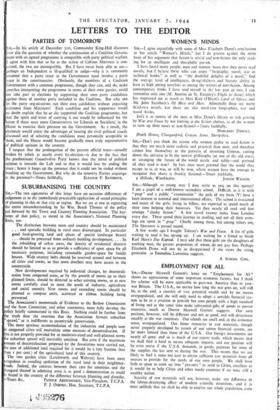PARTIES OF TOMORROW
LETTERS TO
THE EDITOR
his article of December 31st, Commander King-Hall discusses :tier alia the question of whether the continuation of a Coalition Govern- ent with an agreed programme is compatible with party political warfare. agree with him that so far as the action of Cabinet Ministers is con- erned, the two are incompatible. But I have never been able to see- rhaps an Independent is ill-qualified to judge—why it is commonly assumed that a party truce in the Government need involve a party truce in the constituencies. Obviously, the members of a Coalition Government with a common programme, though they can, and do, make speeches interpreting the programme in terms of their own parties, could of take part in elections by supporting their own party candidates against those of another party included in the Coalition. But why not et the party org inisations run their own candidates without expecting sistance from Ministers? Each candidate and his supporters would o doubt explain that he or she supported the Coalition programme, but that the spirit and letter of carrying it out would be influenced for the better if there were more Conservatives (or Liberals or Socialists) in the House to exercise their pressure on the Government. As a result, the electorate would enjoy the advantages of hearing the rival political creeds discussed and of selecting the candidates most personally acceptable to them, and the House would become gradually more truly representative of political opinion in the country.
I suspect that the prolongation of the present official truce—actually broken by rebels at nearly every by-election—is due to the fact that the, predominant Conservative Party knows that the trend of political opinion is towards the Left and so that it would lose by ending the truce ; hence it keeps up the pretence that it could not be ended without breaking up the Government. But why do the minority Parties acquiese






















 Previous page
Previous page